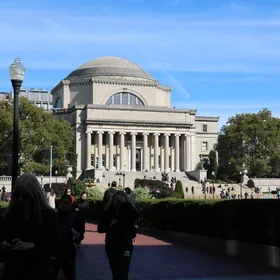By Greg Costanzo | Director of Employer Relations, Career Design Lab, Columbia SPS
The Career Design Lab is proud to relaunch “Behind the Scenes,” a series of interviews with professionals discussing provocative career-related topics that give students industry insights and job searching wisdom. Originally started in 2017, "Behind the Scenes" was a 19-episode podcast featuring conversations with entrepreneurs, chief executives, academic directors, consultants, and authors. Due to the COVID-19 shutdown of New York City and campus, the CDL is now presenting written Q&A-style interviews with talented hiring professionals in tech, finance, healthcare, nonprofit, and consulting.
For the relaunch of “Behind the Scenes,” I had the pleasure of interviewing Michelle Chung, a talent recruiter at a multinational technology company based in Silicon Valley. Here at the CDL, we often hear students understandably express confusion and frustration at the point in their job searches where they’ve submitted their applications, conducted strong interviews and just don’t know what to do with their time while they wait for an answer. They wait...and wait...and wait even longer for the employer to get back to them. “What is taking them so long?” they often ask their career coaches.
I wanted to know what really is happening behind the scenes (no pun intended) after a company receives a job seeker’s application and just how long it takes to get a job. And after talking to Michelle, I got the answers I was looking for. Turns out, all that radio silence is a lot less personal than I originally thought! Please enjoy this conversation with Michelle Chung.
Greg: So Michelle, how long does it really take to get a job, both pre-pandemic and in today’s job market?
Michelle: For junior to mid-level, from application to offer delivery, it takes about 1-3 months on average; this doesn’t include time spent job searching, including sending out resumes. For graduates fresh out of college seeking entry-level roles up through mid-level job seekers, the time to find a job is about 8 weeks. For a senior-level role (manager/director), it tends to take longer--anywhere between 2 and 6 months but could be longer. C-suite positions take a lot longer, factoring in the thorough vetting and interviewing processes plus the fact that there are fewer roles.
Greg: What’s going on in the background at a company that a typical job seeker may not be aware of but that extends the time for the seeker to hear back?
Michelle: Headcount. Before any job gets posted, the headcount must get signed off by finance. There needs to be a business reason, approval of position, and room in the budget. Once the position is posted and candidates are being considered, assessing team fit is a very important step in the decision-making process. When bringing someone onto a team, creating an overall balance of professional levels on that team, including skills, strengths, personalities, etc., is factored.
Another thing that may often be overlooked by job seekers is that a company/team may already have someone slated as the top candidate, internal to the company or not.
Greg: What’s the sequence of steps that typically occur on an employer’s end after a candidate submits an application? Are there typical lengths of time from one step to the next (e.g., application to interview; interview to subsequent rounds, offer to start date, etc.)?
Michelle: The length of time varies so much. Between application and when you’re contacted, a candidate can usually expect to wait between 1 to 2 weeks, but it may be faster or slower depending on whether they have strong candidates in the pipeline. If the candidate progresses through rounds of interviews, he/she can expect there to be about 1 week between every stage.
Greg: You recruited in financial services before moving into the tech industry. Were there any differences in hiring practices and timelines between the two? Similarities?
Michelle: It depends on the company. Generally speaking, roles in tech are more skill and competency-based than in finance where there tends to be more of an emphasis on fit.
There are different ways of viewing candidates as well. In tech, they want to know whether you can do the job and everything else is less important. The number of interviews tends to be fewer in tech. They are more open-minded of your background as long as you have the intelligence.
Financial services interviews focus a lot more at the candidates’ personal characteristics, traits, and communication skills. For example, you may have to do more presentations to clients in these roles.
Greg: How much rejection and radio silence is personal?
Michelle: Generally speaking, it’s not personal, especially if roles are highly competitive and they attract strong applicants. Plus, if folks are already being considered, it doesn’t have anything to do with you as a qualified candidate. Another thing is the volume of applications. It may be the case that your resume may not even be looked at because the recruiters simply don’t have the time. However, at most top companies, people do look at candidates’ profiles. Here’s some advice: apply to as many jobs as you can and ask for referrals. If you have a contact at any of these companies, you’re ahead of the game. A referral typically brings your application to the top of the pile.
Greg: What are your thoughts on candidates following up with recruiters or hiring managers?
Michelle: Keep in touch with recruiters! Email them; calling is intrusive. Email every couple of months. Include an updated resume; share new developments in your career. Reiterate your interest. Share a particular role you saw and ask if the recruiter can put you in touch with the right person or knows anything about it. They can also let you know of roles you may not be aware of.
Greg: What are some other tips for job seekers out there today?
Michelle: Cast your net wide and don’t give up. Don't be discouraged by rejection. You can apply at the same company for many different roles, but your choice for positions should tell a cohesive story.
These days, the job search will take longer, obviously, but it also depends on the job function. Interviews have shifted to virtual and the recruiting timeline is up in the air (not sure how things will evolve). If your hiring has come to a halt, just keep in touch with your recruiting or company contact. Things will get better.
Michelle’s message of perseverance can never go wrong. A successful job search also feels more successful when you’ve experienced rejection at some point along the journey. It’s a disappointing truth but it awakens job seekers to the stark reality that there are other people out there who are either better for the job or better positioned to get it. And when you accept that truth, you realize that it’s not personal, it is a numbers game, and the more people you can get in your corner, the closer you are to your goal.
If you want to work on your professional communication skills, the American Language Program and CDL have collaborated on a new course, U.S. Career and Communication Accelerator that gives graduate students a competitive edge in the U.S. job market.
If you’re a student or graduate, we want to hear from you. What specifically would you like to learn about the “Behind the Scenes” details of the job search or career advancement process? Submit your questions to careerdesignlab [[at]] columbia [[dot]] edu. In the meantime, make connections with recruiters on LinkedIn and stay in contact with your Career Coach here at the CDL.


